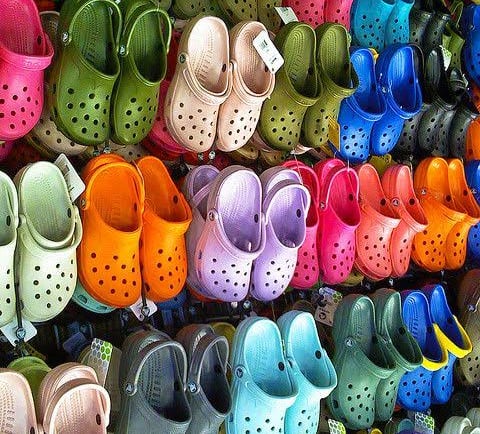👟 Welcome to Crocsy Vibe – Where Comfort Meets Global Style! 🌈
Crocs' Latest Sustainability Innovations
Discover Crocs' commitment to sustainability with bio-based Croslite™ foam, innovative recycling programs, and eco-friendly manufacturing practices. Learn how Crocs is paving the way for circular f...
SHARAD RAJGURU
7/25/20257 min read


Introduction to Crocs and Sustainability
Crocs is a well-established brand recognized for its distinctive, comfortable footwear that has garnered a loyal customer base worldwide. Since its inception in 2002, Crocs has revolutionized the footwear industry through innovative designs and an acute focus on comfort. However, as environmental concerns have grown globally, the brand has increasingly shifted its focus to sustainability, reflecting a commitment to not only customer satisfaction but also ecological responsibility.
The fashion industry is a significant contributor to environmental degradation, responsible for substantial waste production, carbon emissions, and resource depletion. In this context, sustainable practices are of paramount importance, as they help minimize negative impacts on the environment. Crocs recognizes the urgent need to address these issues by integrating sustainability into its core business practices. This includes rethinking materials, improving production processes, and exploring avenues for circular economy initiatives, which aim to extend the lifecycle of its products.
To align its brand with environmentally friendly principles, Crocs has taken various initiatives geared towards sustainability. For instance, the brand is increasingly incorporating recycled materials into its products, while also focusing on more sustainable manufacturing processes. Strategies such as these not only enhance the durability and performance of Crocs footwear but also resonate with the eco-conscious consumers who prioritize environmentally responsible purchases. By fostering a culture of sustainability, Crocs is not only addressing current environmental challenges but is also paving the way for responsible innovation within the fashion industry.
Innovative Materials: Bio-based Croslite™ Foam
Crocs has established a prominent position in the footwear industry, not only for their unique designs but also for their commitment to sustainability. A significant stride in this direction is their pioneering use of bio-based Croslite™ foam, a revolutionary material that has garnered attention due to its eco-friendly attributes. Derived from renewable sources, this innovative foam marks a substantial shift away from conventional materials that contribute heavily to carbon emissions.
The primary component of bio-based Croslite™ foam is derived from a biopolymer sourced from plants, which significantly reduces the environmental footprint associated with production. Unlike traditional petroleum-based materials, bio-based Croslite™ foam harnesses the power of agriculture, promoting a circular economy that prioritizes sustainability. This switch not only diminishes greenhouse gas emissions during the manufacturing process but also utilizes materials that are readily available, leading to a more sustainable supply chain.
In terms of comfort and performance, bio-based Croslite™ foam maintains the high standards Crocs is known for, offering a lightweight, flexible, and cushiony experience for the wearer. Additionally, its durability ensures that products have a longer lifespan, further reducing waste in landfills. Beyond the immediate benefits, the use of this innovative material also opens up pathways for future advancements in the development of eco-friendly products across the fashion and footwear sectors.
As consumers become increasingly aware of the environmental impacts of their purchases, Crocs’ investment in bio-based Croslite™ foam reflects a response to this shift in market demand. By choosing sustainable materials, Crocs not only leads the charge in innovation but also helps foster a culture of environmental responsibility within the industry. The transition to bio-based Croslite™ foam exemplifies the brand's dedication to creating a more sustainable and environmentally friendly future for footwear.
Sustainable Manufacturing Methods
Crocs has been at the forefront of sustainability in the footwear industry, implementing various innovative manufacturing practices designed to minimize the environmental impact of their production processes. A crucial aspect of their sustainability strategy is the commitment to reducing water usage in manufacturing. Crocs uses advanced techniques that significantly decrease the amount of water needed compared to traditional footwear manufacturing methods. Water conservation not only alleviates stress on local water resources but also contributes to the overall sustainability goals of the organization.
In addition to water efficiency, Crocs has adopted energy-saving measures that reduce the carbon footprint associated with their production. By utilizing state-of-the-art machinery and optimizing energy use through efficient operational processes, Crocs continues to lower energy consumption throughout their manufacturing facilities. This optimization not only contributes to a sustainable future but also enhances operational efficiency, thus supporting the company's long-term viability in a competitive market.
Waste reduction is another critical component of Crocs’ sustainable manufacturing efforts. The brand has implemented strategies aimed at minimizing waste generated during the production process. For instance, Crocs emphasizes circularity by integrating recycled materials into their products and facilitating recycling initiatives at the end of a product’s life cycle. This holistic approach ensures that their waste management practices align with global sustainability standards, reinforcing their commitment to environmental stewardship.
Through these sustainable manufacturing methods, Crocs exemplifies how innovation in production processes can align with the principles of sustainability. By focusing on water conservation, energy efficiency, and waste reduction, Crocs not only improves their operational practices but also leads the way for other companies in the footwear industry to adopt similar sustainable practices. As they continue to refine and enhance their manufacturing methods, Crocs undoubtedly sets a standard for environmentally conscious production in the years to come.
Circular Fashion: Takeback and Recycling Programs
Crocs has undertaken significant steps towards sustainability through its circular fashion initiatives, particularly emphasized by its takeback and recycling programs. These programs encourage customers to return old pairs of Crocs, thereby diverting waste from landfills and promoting a culture of reusability. The concept of circular fashion is crucial in today’s consumer landscape, where the traditional linear model of "make, use, dispose" is increasingly challenged by the urgent need for sustainable practices.
The takeback program allows customers to return their worn-out Crocs to designated locations, where these products undergo a transformative process. The returned shoes are meticulously inspected and evaluated for their potential reuse. Items that are still in good condition are cleaned and prepared for resale, while those that are beyond repair are redirected towards innovative recycling measures. The material from these old shoes can be repurposed into new shoes or even upcycled into accessories, demonstrating a commitment to minimizing waste and maximizing the lifecycle of each product.
This initiative not only benefits the environment but also fosters a sense of accountability among consumers. By participating in the program, customers contribute to a sustainable fashion ecosystem, reinforcing their role in combating environmental issues. Crocs encourages this participation by offering various incentives, such as discounts on future purchases, which not only promotes return rates but also strengthens brand loyalty. The integration of such programs highlights the importance of reusability in the fashion sector, showcasing how brands can act responsibly while still maintaining their market appeal.
Through these endeavors, Crocs aims to set a benchmark within the fashion industry, inspiring other brands to adopt similar recycling measures. Overall, Crocs' commitment to circular fashion underscores the brand's dedication to sustainability and its vision for a more environmentally friendly future.
Collaborations and Partnerships for Sustainability
In recent years, Crocs has emerged as a prominent player in promoting sustainability within the footwear industry through an array of strategic collaborations and partnerships. Recognizing the pressing need for eco-friendly practices, the company has joined forces with various organizations and NGOs that are equally committed to environmental stewardship. These collaborations aim not only to reduce the environmental impact of footwear production but also to inspire innovation and encourage sustainable practices within the industry.
One notable partnership is with the organization "Soles4Souls," which focuses on alleviating poverty by providing footwear and other essential items to those in need. Through this partnership, Crocs has facilitated the donation of thousands of pairs of shoes, thereby ensuring that excess inventory is repurposed effectively rather than ending up in landfills. This initiative not only highlights Crocs' dedication to sustainability but also addresses social responsibility.
Additionally, Crocs has partnered with companies engaged in the development of biodegradable materials for its footwear. Collaborating with these innovators allows Crocs to explore new materials that could significantly lessen the ecological footprint of their products. For example, the potential use of plant-based material may become a cornerstone of Crocs' future product lines, ultimately aligning their manufacturing processes with sustainable practices and reducing reliance on traditional petrochemical resources.
Furthermore, collaboration with environmental NGOs aids in enhancing Crocs' CSR initiatives, launching eco-awareness campaigns directed at promoting sustainable living among consumers. Such partnerships are pivotal in shifting consumer attitudes toward sustainability, fostering a culture of conscientious consumption. Through these varied collaborations and partnerships, Crocs is not only aiming for business success but also prioritizing the health of the planet and contributing positively to society.
Consumer Awareness and Sustainable Choices
As consumers become increasingly aware of the environmental impacts of their purchases, the footwear industry is adapting to this shift in awareness. Crocs has recognized the importance of fostering a culture of sustainability among its customer base. To achieve this, Crocs has implemented various strategies aimed at educating consumers about the benefits of sustainable footwear choices.
One significant initiative is the company's commitment to transparent marketing practices. By sharing information about the sustainable materials used in their products, Crocs informs consumers about the environmental benefits associated with their footwear. This includes utilizing recycled materials and adopting eco-friendly production processes that minimize waste and carbon footprint.
In addition to traditional marketing tactics, Crocs leverages social media platforms to amplify its sustainability message. The brand actively engages with its audience through campaigns that highlight sustainable practices as well as the importance of responsible consumption. By encouraging users to share their experiences with Crocs products, the company fosters a community driven towards sustainability, making the message more relatable and impactful.
Furthermore, Crocs has organized customer engagement initiatives, such as workshops and community events, to discuss the significance of sustainability in the footwear industry. These interactions allow consumers to explore the nuances of sustainable choices, motivating them to make informed decisions while purchasing footwear. Such efforts are crucial in promoting a sustainable lifestyle that extends beyond footwear alone, encouraging consumers to apply the principles of sustainable living to their broader purchasing habits.
By focusing on consumer education and awareness, Crocs not only highlights its own sustainable practices but also empowers customers to make choices that contribute positively to the environment. Through these educational initiatives, Crocs aims to cultivate a loyal customer base that prioritizes sustainability, while simultaneously influencing industry standards towards greener alternatives in footwear.
The Future of Crocs and Sustainable Footwear
The landscape of the footwear industry is undergoing significant transformation, particularly in the realm of sustainability. As consumer awareness around environmental issues continues to rise, brands are compelled to reevaluate their manufacturing processes and material sourcing to align with the values of conscious consumers. Crocs, as a notable player in this sector, is poised to lead the charge toward creating stylish and sustainable footwear options. Innovations in materials, production methods, and recycling initiatives are anticipated to play crucial roles in this evolving market.
One area of potential development lies in the use of bio-based materials and eco-friendly production processes. Crocs has already begun experimenting with various alternatives, including plant-based plastics and recyclable components. This focus on sustainable materials not only reduces the environmental footprint of each pair of shoes but also resonates with consumers who are increasingly prioritizing sustainability in their purchasing decisions. Advances in technology could also yield breakthroughs in manufacturing techniques, enabling the brand to produce footwear that minimizes waste and lowers energy consumption.
However, associated challenges remain. Balancing cost-effectiveness with sustainability is an ongoing concern, as conventional materials and processes may still be more economically viable. Additionally, the footwear industry must also address issues related to consumer behavior; it is essential to educate customers about the value of sustainable options and foster a cultural shift towards environmentally responsible consumption. Crocs aims to tackle these challenges directly by engaging with its community and ensuring transparency in its sustainability goals.
As the future of Crocs unfolds, the brand appears committed to shaping a sustainable footwear landscape that aligns with evolving consumer values while addressing environmental concerns. By combining style with sustainability, Crocs is set on a promising path, demonstrating that responsible practices can coexist with fashion-forward designs.

Get in touch
Address
3721 Single Street
Quincy, MA 02169
Contacts
123-456-7890
info@email.com
